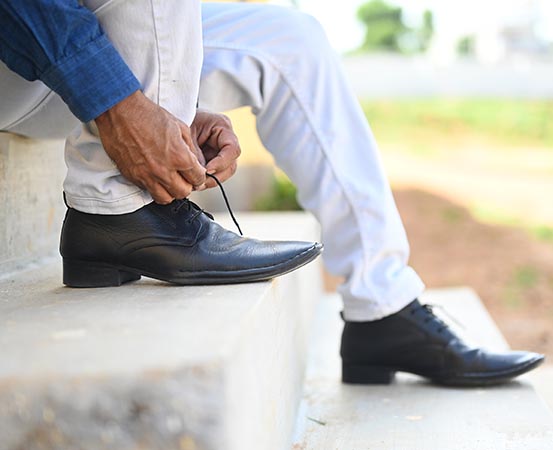
Shoes are not only a fashion statement. They protect the feet and our bodies. Beyond aesthetics, shoes have a profound impact on our feet and posture and influence our overall well-being. Narrow shoes or the wrong-sized footwear can compromise the health of our feet, which affects our posture, comfort and stability.
What do narrow shoes do to your feet?
Narrow shoes can have a detrimental effect on the structure of your feet. “Constricted footwear affects us in different ways — if the toe space is compromised, it can lead to various foot deformities, like bunions (hallux valgus), ingrown toenails, calluses under the foot or even corns,” says Dr Sarika Jambhulkar, practising podiatrist, FootImpact Podiatry Clinic, Mumbai.
Shoes with a tapered front can contribute to the development of hammertoes, which occur when one or more toes are bent at the middle joint. The restrictive toe box doesn’t provide enough space for toes to lie flat and splay out naturally, leading to an abnormal flexion of the toe joints.
When you wear narrow shoes, the toes are compressed together, compromising their natural splayed position. Wearing such shoes for a long time can compress the nerves, bones, muscles and blood vessels, leading to conditions such as neuromas, poor circulation and more.
Similarly, footwear with high heels come with their own set of challenges. “While wearing high heels, the maximum pressure will be under the forefoot. As a result, people can develop calluses or corn under their feet,” says Dr Jambhulkar.
High-heeled shoes tend to squish the toes, too. Moreover, over time, it can result in pinched nerves, as well as a variety of aches and pains. “Most people are unaware that when someone wears heels, it leads to tightness of the calf muscles and that hampers their spine and affects their entire posterior chain [muscle groups from the upper back to calf muscles on the backside of the body]. Any footwear or shoes which put more pressure on the forefoot can hamper the posture — the higher the heels, the poorer the stance,” adds Dr Jambhulkar.
How wrong shoes can wrong you
“At our clinic, we see almost 70 per cent of people wearing the wrong-sized shoes. They are either slightly smaller or slightly bigger because they are unaware of the ideal minimum width of shoes,” says Dr Jambhulkar.
Shoes that are too small or too big misalign muscles and bones in the feet. If the footwear is too constricting, it forces your feet into an unnatural position for which your ankles, knees and hips must compensate.
“There is a trend of wearing narrow formal shoes, even among men, to offices and weddings, just because it looks smart,” says Dr Jambhulkar. “But in the long run, this leads to various problems like a tingling numbness in the foot or ingrowth of nails that can affect their foot health. In diabetic patients, it can lead to further ulcerations.”
But, if the shoes are too loose, your feet will slide around inside, which can lead to stability issues.
When your feet are not adequately supported, certain muscles are overworked or underutilised. This will affect the alignment of your ankles, knees and hips and lead to poor posture and pain in the long run.
How to choose the right shoes for you?
“You must wear shoes that are the correct size, particularly when it comes to sports shoes,” says Dr Jambhulkar. “People usually check the size number, say 8 or 9, but it is also necessary to measure the length and width of the foot on a Brannock device. This will let you know if someone needs a 9 wide size instead of just the regular size 9.”
Cushiony shoes may seem comfortable, but they may not be the best for you. “Take sports shoes, for example. The ankle section of such footwear must be firm,” says Dr Jambhulkar. “People often opt for flexible shoes, and even footwear brands market them as such, but these are not good. One must buy steady shoes which are not flexible from the midfoot.”
The right shoes should be one thumb space between the toes (usually the big toe) and the shoe wall, the front of the shoe. Moreover, people should have enough place to wriggle their toes comfortably.
We must choose our footwear based on the amount of time spent standing and walking in them. “For example, if you’re heading to the mall for shopping, where you are likely to stand for long hours, sports shoes are advisable. If you go for dinner or a movie where you won’t walk as much, you can opt for fancier shoes,” says Dr Jambhulkar.
Takeaways
- Narrow shoes cause many problems, such as bunions, hammertoes and ingrowth of nails.
- Shoes that are too small or too big can misalign muscles and bones in the feet and force your feet into an unnatural position, causing your ankles, knees and hips to compensate.
- Choose the right shoes based on the proper size and ample toe space. Also, opt for footwear suited to the occasion.
















